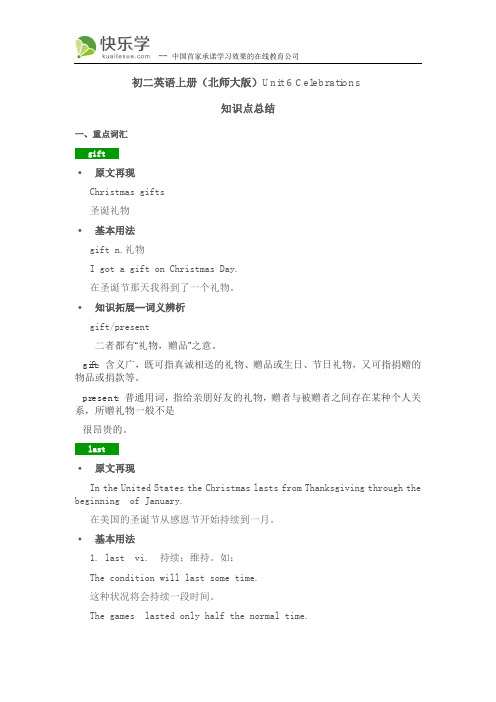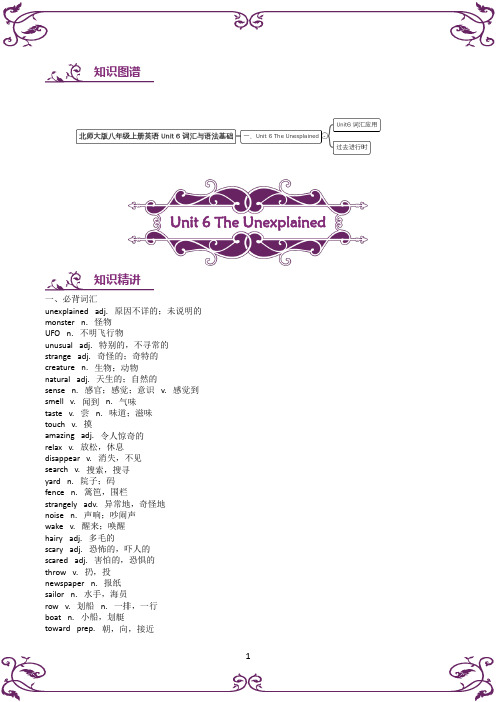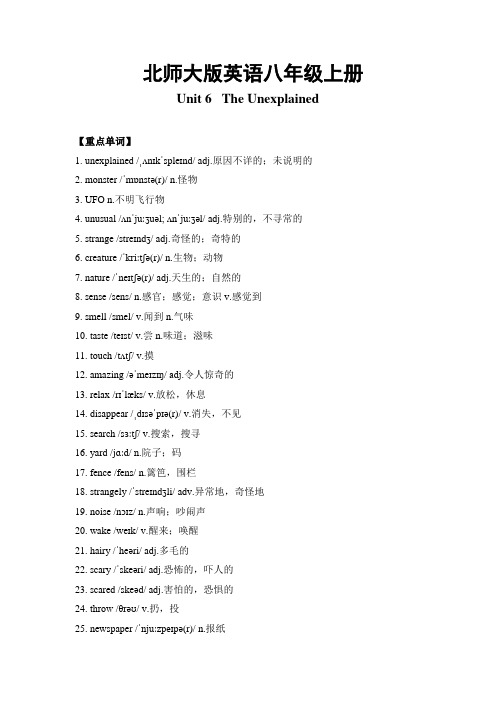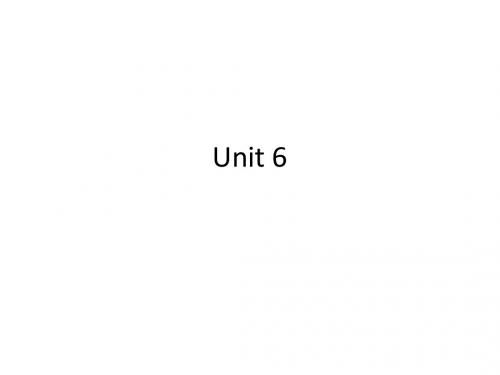北师大版初二英语第六单元重点词汇讲解
- 格式:doc
- 大小:49.50 KB
- 文档页数:5

Unit 6 The Unexplained词汇精讲精练:词汇精讲1. smell(1)smell作实义动词,意为“闻”。
例如:Please smell the soup! 请闻闻这汤!(2)smell作系动词,意为“闻起来”,后接形容词作表语。
例如:Dinner smells good. 晚饭闻起来很香。
【拓展】类似smell作系动词的词还有:look(看上去);feel(感觉起来、摸上去);sound(听起来);taste(品尝)等。
例如:The music sounds beautiful. 这首音乐听起来很美。
The food tastes good. 食物尝上去很香。
注意:smell; look等系动词不同于系动词be,它们在变疑问句或否定句时不能简单地提到主语之前或加not,而是要通过助动词do/does/ did等来帮助实现。
例如:Does it smell nice? 它闻起来很好吗?The chicken doesn’t taste good. 鸡肉尝起来不好。
How do the children look? 孩子们看起来怎么样?2. taste(1)taste作及物动词,意为“尝,尝出”,后常接表示物品的名词或代词作宾语。
例如:He tasted the bread. 他尝了尝这面包。
Can you taste the mutton in the soup? 你能尝出汤里的羊肉味吗?(2)taste作连系动词,意为“尝起来”,后接形容词作表语。
例如:The food tastes good. 这食物尝起来很好。
(3)taste作名词,意为“味道,滋味”。
例如:I don’t like the taste of the cheese. 我不喜欢这奶酪的味道。
3. searchsearch作不及物动词,意为“搜索,搜寻”。
search for意为“搜寻,找寻”,其后跟被搜寻的人或物。

初二英语上册(北师大版)Unit 6 Celebrations知识点总结一、重点词汇gift·原文再现Christmas gifts圣诞礼物·基本用法gift n.礼物I got a gift on Christmas Day.在圣诞节那天我得到了一个礼物。
·知识拓展--词义辨析gift/present二者都有“礼物,赠品”之意。
gift:含义广,既可指真诚相送的礼物、赠品或生日、节日礼物,又可指捐赠的物品或捐款等。
present:普通用词,指给亲朋好友的礼物,赠者与被赠者之间存在某种个人关系,所赠礼物一般不是很昂贵的。
last·原文再现In the United States the Christmas lasts from Thanksgiving through the beginning of January.在美国的圣诞节从感恩节开始持续到一月。
·基本用法1. last vi. 持续;维持。
如:The condition will last some time.这种状况将会持续一段时间。
The games lasted only half the normal time.比赛只持续了通常时间的一半。
2. last adj. 最后的。
如:I am the last one to come here.我是最后一个来这的。
celebrate·原文再现Christmas celebrates the birth of Jesus Christ.圣诞节是庆祝耶稣基督的诞生。
·基本用法celebrate v.庆祝,歌颂,赞扬(过去式:celebrated 过去分词:celebrated 现在分词:celebrating 第三人称单数:celebrates)Tom celebrated his 24th birthday two days ago.汤姆两天前庆祝了他的24岁生日。

知识图谱Unit6The Unexplained知识精讲一、必背词汇unexplained adj.原因不详的;未说明的monster n.怪物UFO n.不明飞行物unusual adj.特别的,不寻常的strange adj.奇怪的;奇特的creature n.生物;动物natural adj.天生的;自然的sense n.感官;感觉;意识v.感觉到smell v.闻到n.气味taste v.尝n.味道;滋味touch v.摸amazing adj.令人惊奇的relax v.放松,休息disappear v.消失,不见search v.搜索,搜寻yard n.院子;码fence n.篱笆,围栏strangely adv.异常地,奇怪地noise n.声响;吵闹声wake v.醒来;唤醒hairy adj.多毛的scary adj.恐怖的,吓人的scared adj.害怕的,恐惧的throw v.扔,投newspaper n.报纸sailor n.水手,海员row v.划船n.一排,一行boat n.小船,划艇toward prep.朝,向,接近dive v.跳水,潜水side n.边缘;一边,一侧imaginary adj.想象中的,虚构的might v.可能;可以prove v.证明,证实brain n.脑asleep adj.睡着的probably adv.很可能human n.人common adj.普通的,常见的realise v.意识到,领会radio n.无线电广播pyjama n.睡衣裤二、重点词汇1.unexplained adjective/ʌnɪkˈspleɪnd/Unexplained events,behaviour,etc.are ones for which people do not know or understand the reason.(事件、行为等)未说明的,未解释的,原因不详的例句:He was shot dead earlier this year in unexplained circumstances.他在今年早些时候莫名其妙地被人开枪打死了。


北师大版英语八年级上册Unit 6 The Unexplained【重点单词】1. unexplained /ˌʌnɪkˈspleɪnd/ adj.原因不详的;未说明的2. monster /ˈmɒnstə(r)/ n.怪物3. UFO n.不明飞行物4. unusual /ʌnˈjuːʒuəl; ʌnˈjuːʒəl/ adj.特别的,不寻常的5. strange /streɪndʒ/ adj.奇怪的;奇特的6. creature /ˈkriːtʃə(r)/ n.生物;动物7. nature /ˈneɪtʃə(r)/ adj.天生的;自然的8. sense /sens/ n.感官;感觉;意识 v.感觉到9. smell /smel/ v.闻到 n.气味10. taste /teɪst/ v.尝 n.味道;滋味11. touch /tʌtʃ/ v.摸12. amazing /əˈmeɪzɪŋ/ adj.令人惊奇的13. relax /rɪˈlæks/ v.放松,休息14. disappear /ˌdɪsəˈpɪə(r)/ v.消失,不见15. search /sɜːtʃ/ v.搜索,搜寻16. yard /jɑːd/ n.院子;码17. fence /fens/ n.篱笆,围栏18. strangely /ˈstreɪndʒli/ adv.异常地,奇怪地19. noise /nɔɪz/ n.声响;吵闹声20. wake /weɪk/ v.醒来;唤醒21. hairy /ˈheəri/ adj.多毛的22. scary /ˈskeəri/ adj.恐怖的,吓人的23. scared /skeəd/ adj.害怕的,恐惧的24. throw /θrəʊ/ v.扔,投25. newspaper /ˈnjuːzpeɪpə(r)/ n.报纸26. sailor /ˈseɪlə(r)/ n.水手,海员27. row /rəʊ/ v.划船 n.一排,一行28. boat /bəʊt/ n.小船,划艇29. toward /tə'wɔːd/ prep.朝,向,接近30. dive /daɪv/ v.跳水,潜水31. side /saɪd/ n.边缘;一边,一侧32. imaginary /ɪˈmædʒɪnəri/ adj.想象中的,虚构的33. might /maɪt/ v.可能;可以34. prove /pruːv/ v.证明,证实35. brain /breɪn/ n.脑36. asleep /əˈsliːp/ adj.睡着的37. probably /ˈprɒbəbli/ adv.很可能38. human /ˈhjuːmən/ n.人39. common /ˈkɒmən/ adj.普通的,常见的40. realise /'rɪəlaɪz/ v.意识到,领会41. radio /ˈreɪdiəʊ/ n.无线电广播42. pyjama /pəˈdʒɑːmə/ m.睡衣裤【重点短语】1. right now 现在;立刻,马上2. in fact 事实上,实际上3. wake up 叫醒;醒来4. take sb for a walk 带某人去散步5. search for 寻找6. run around 东跑西跑7. walk away 走开8. on holiday 在度假9. take out 拿出来10. come up 上升,发生,开始11. ride a bicycle 骑自行车12. dream about 梦想,梦到13. right now /at once 马上14. fly over 飞过15. make friends with 和……交朋友16. wait for 等待17. run after 追逐,追赶18. forget to do sth 忘记要去做某事19. be mixed up 混杂,搞混,弄糊涂20. go away 走开,离开21. arrive at 到达22. again and again 再三地,反复地【重点句型】1. You can see, smell, taste and feel cheese but you can’t hear it!你可以看、闻、尝和感觉奶酪,但你却听不到它!2. —Were they doing their homework when I went shopping?我去购物的时候他们在做作业吗?—Yes, they were.是的,他们在。

学习目标掌握重点短语的用法。
重点:dream about ; in pyjamas ; in fact ; right now ; again and again难点:dream作及物动词和不及物动词的用法;dress的用法。
知识梳理【短语学习】1. dream about 梦见dream about 意为“梦见”,与dream of同义,其后可跟名词、代词或动词-ing形式。
此处dream作动词,意为“做梦”,其过去式、过去分词均为:dreamed或dreamt。
The boy dreamt about / of his grandfather last night. 这个男孩昨晚梦见他爷爷了。
常考查dream用作不及物动词,后接about或of,再接宾语。
I used to dream ____________ it when I was a boy.A. aboutB. withC. forD. on答案:A思路分析:题意:当我还是孩子的时候就梦到了它。
dream about sb. 梦到某人。
故选A。
2. in pyjamas 穿着睡衣in pyjamas 中in为介词,意为“穿戴(衣服等)”,表示状态。
She is in a red coat. 她穿着一件红色的外套。
考查“穿”的不同表示方法,如:in, dress, put on, wear等。
The girl in red is my sister. 穿着红衣服的女孩是我姐姐。
He is wearing jeans today. 他今天穿着牛仔裤。
Put on your coat. It is too cold outside. 穿上你的外套。
外面太冷。
The boy is too young to dress himself. 这个男孩太小了,不会自己穿衣服。
助记:“穿戴”动作put on,状态wear已穿上。
穿鞋袜,着服装,眼镜、手套、帽戴上。
Unit 6 Detectives词汇精讲精练:词汇精讲1. truthtruth作“不可数名词”,意为“真想;实情”,常构成固定短语to tell the truth,意为“说实话”。
例如:How do we know you’re telling the truth? 我们怎样知道你说的是实话?【拓展】(1)true作形容词,意为“确实的;正确的”,常用于承认事实或说法正确。
例如:I t’s true that you’ve passed the exam, but will you go on working hard?你确实已经通过了考试,但是你会继续努力学习吗?(2)true作形容词,意为“符合事实的,真实的”。
例如:The novel is based on a true story. 这部小说是根据一个真实的故事(写成的)。
(3)truly作副词,意为“真正,确实”。
例如:I can truly say I’ve never been so sad. 说实在的,我从未这样伤心过。
2. at leastat least意为“至少”,常用于数量词之后。
例如:It’ll take two hours at least. 它至少要花费两个小时。
【拓展】at most意为“最多”。
例如:There were 50 people at most in the room. 房间里最多有50个人。
3. doubtdoubt作可数名词,意为“怀疑,不确定,疑问”。
例如:There are some doubts about the best way to do it. 做这件事的最佳办法是有些不确定。
【拓展】doubt作动词,意为“无把握,不能肯定”。
例如:I never doubted she would come. 我从未怀疑过她会来。
4. reappearreappear作动词,意为“重新出现”,由“前缀re-+appear”构成。
北师大版初二英语第六单元重点词汇讲解重点词汇讲解last【典例探究】1. In the United States the Christmas season lasts from Thanksgiving through the beginning of January.在美国,圣诞季节从感恩节开始并持续到一月初。
2. The meeting only lasted (for) ten minutes.会议只开了十分钟。
【点拨与思考】last用作_______, 表示“持续,维持”,如例句1,不能用于进行时。
last (for) + 时间段,表示“______________”, 如例句2。
答案揭秘:动词;持续多久【知识拓展】last还可用作形容词,有以下两种含义:◆表示“最后的; 末尾的”。
例如:I didn’t catch the last bus, so I had to walk home.我没有赶上末班车,所以不得不步行回家。
◆表示“上一个的”。
例如:I saw the film Kongfu Panda 2 last weekend.上周末我看了电影《功夫熊猫2》。
last还常用于短语at last 中,表示“最后,最终”,相当于in the end。
【活学活用】根据汉语提示完成英文句子。
1. The speech will ____________ (持续大约一小时).2. He __________________ (去年回到了他的家乡).Key:1. last (for) about an hour2. returned to / went back to his hometown last yearcelebrate【典例探究】1. Christmas Day itself, celebrating the day that Jesus Christ was born, is on December 25.圣诞节是庆祝耶稣基督诞生的日子,是在12月25日。
重点词汇讲解last【典例探究】1. In the United States the Christmas season lasts from Thanksgiving through the beginning of January.在美国,圣诞季节从感恩节开始并持续到一月初。
2. The meeting only lasted (for) ten minutes.会议只开了十分钟。
【点拨与思考】last用作_______, 表示“持续,维持”,如例句1,不能用于进行时。
last (for) + 时间段,表示“______________”, 如例句2。
答案揭秘:动词;持续多久【知识拓展】last还可用作形容词,有以下两种含义:◆表示“最后的; 末尾的”。
例如:I didn’t catch the last bus, so I had to walk home.我没有赶上末班车,所以不得不步行回家。
◆表示“上一个的”。
例如:I saw the film Kongfu Panda 2 last weekend.上周末我看了电影《功夫熊猫2》。
last还常用于短语at last 中,表示“最后,最终”,相当于in the end。
【活学活用】根据汉语提示完成英文句子。
1. The speech will ____________ (持续大约一小时).2. He __________________ (去年回到了他的家乡).Key:1. last (for) about an hour2. returned to / went back to his hometown last yearcelebrate【典例探究】1. Christmas Day itself, celebrating the day that Jesus Christ was born, is on December 25.圣诞节是庆祝耶稣基督诞生的日子,是在12月25日。
2. They celebrated their victory with a party.他们以一场晚会来庆祝他们的胜利。
【点拨与思考】celebrate用作动词, 表示“_______”,后面可以直接接宾语,如例句1。
_________ _______ 结构表示“以……(方式)庆祝”,如例句2。
答案揭秘:庆祝;celebrate ... with ...【知识拓展】celebration 是celebrate的名词形式, 表示“庆祝;庆祝活动”。
hold a celebration 表示“举行庆祝会”;in celebration of ... 表示“为了庆祝……”。
例如:This activity is in celebration of our graduation.这个活动是为了庆祝我们毕业。
【活学活用】选词填空。
1. People around the world ______ (celebrate; celebration) this festival in different ways.2. They had the party in celebration __________ (of; for) Bill’s birthday.Key:1. celebrate2. ofsend【典例探究】1. At this time of year, people send Christmas cards to friends and family.在每年的这个时候,人们会给自己的朋友和家人寄圣诞卡。
2. I sent my sister a gift on her birthday.在姐姐生日时我给她寄了一件礼物。
【点拨与思考】send 用作______,表示“送,寄,发送”, 其过去式为sent,可用于______________ 结构中,表示“把某物寄给某人”,等同于send sb. sth.,如例句1和例句2。
答案揭秘:动词;send sth. to sb.【知识拓展】send还可以表示“派遣(某人去);命令(某人去)”,常用于send sb. to do sth.结构中,表示“派遣某人做某事”。
例如:My father sent me to buy some fruit.爸爸叫我去买些水果。
send的其他常用词组有:send for派人去叫/ 请;send up发射;send off 寄出;给……送行;send out派遣;发出。
例如:Mary has a bad cold. We must send for a doctor at once.玛丽感冒很严重,我们必须马上派人去请医生。
They are going to send up another rocket next year.他们打算明年再发射一枚火箭。
【活学活用】用适当的介词填空。
1. Cindy sent a beautiful card ________ me last Christmas.2. Peter fell off the stairs. Please send ________ the teacher right away.Key:1. to 2. forinclude【典例探究】People always include farm animals and the men who were the first people to visit Jesus.人们还在旁边添上一些牲畜及耶稣出生最早的见证者。
【点拨与思考】include可用作动词,表示“____________”, 如例句, 不可以用于进行时态。
答案揭秘:包括,包含【知识拓展】including是介词,表示“包括……在内”。
例如:This singer sang many songs, including some of my favorites.这个歌手唱了很多歌,包括我最喜欢的一些歌。
【活学活用】选用include, including填空。
1. His writings __________ novels and poems.2. When I was a child, I hated animals, _________ dogs.Key:1. include 2. includingclap & cheer【典例探究】1. When the ball reached the bottom, it was New Year and everyone clapped and cheered and shouted.当球到达底部时我们迎来了新年, 每个人都在鼓掌、欢呼和叫喊。
2. Helen was so happy that she clapped her hands.海伦高兴得鼓起了掌。
3. People all cheered the champion as he walked by.当冠军走过的时候,人们都向他欢呼致意。
【点拨与思考】clap用作动词,表示“_________”,如例句1和例句2;cheer用作________,表示“欢呼;加油”,如例句1和例句3。
答案揭秘:鼓掌,轻拍;动词【知识拓展】◆clap sb. on the shoulder / back,表示“轻拍某人的肩或背”。
例如:My teacher clapped me on the shoulder to suggest her encouragement.我的老师轻轻地拍了拍我的肩, 表示鼓励。
◆cheer的常用短语有:cheer (sb./ sth.) up (使)变得高兴, (使)振奋起来;cheer sb. on (赛跑、比赛等中)为某人加油。
例如:Cheer up! You’ll do well!振作起来吧! 你一定会做得很好!I’ll cheer you on at the sports meeting tomorrow.明天运动会上我会为你加油。
【活学活用】用适当的介词或副词填空。
1. He clapped the winner _______ the back and congratulated him.2. Mary is sad. Let’s do something to cheer her _____!Key:1. on 2. uparrive【典例探究】1. We arrived at Times Square at about eight o’clock.我们八点左右到达了时代广场。
2. She arrived in Beijing last week.她上周到达了北京。
3. When did you arrive home last night?昨晚你什么时候到家的?【点拨与思考】arrive表示“_____ ___________”,是不及物动词,后接宾语时需要在地点名词前加上介词at或_________,区别在于:at后常接表示小地方的名词(如小城、村子、车站等),如例句1;in后常接表示大地方的名词(如国家、大城市等),如例句2。
当arrive后接地点副词home, here, there等时不需加任何介词,如例句3。
答案揭秘:到达,抵达; in【知识拓展】reach和get也可以表示到达,但在用法上和arrive有区别:◆reach为及物动词,后面可直接接地点, 即reach somewhere,表示“到达某地”。
例如:They will reach Paris tomorrow.他们明天将到达巴黎。
◆get为不及物动词,后接地点名词时需加上介词to,即get to somewhere,表示“到达或抵达某地”。
当接地点副词home, here, there等时需去掉to。
例如:When I got to the office, she had left.我到达办公室的时候她已经走了。
【友情提示】reach, get to, arrive at (in)可互换使用。
【活学活用】选词填空。
1. She arrived _______ (at; in) the station at 3:00 yesterday afternoon.2. Excuse me, how can I ________ (get; reach) to the museum?Key:1. at2. getsurprise【典例探究】1. We’ll throw a surprise party for Dad.我们要为爸爸举办一个惊喜的宴会。
2. She looked at me in surprise when I told her the news.当我告诉她这个消息时,她惊讶地看着我。